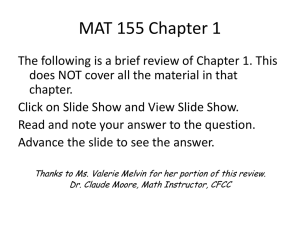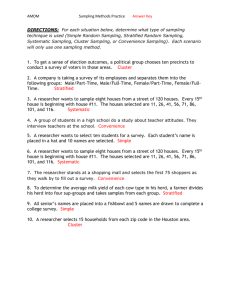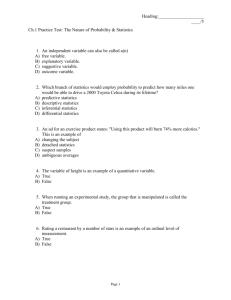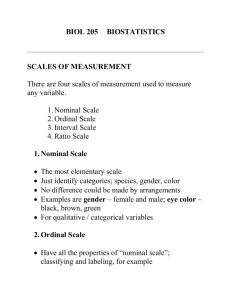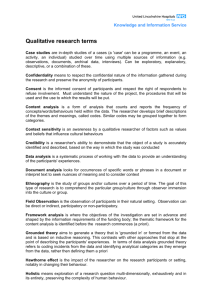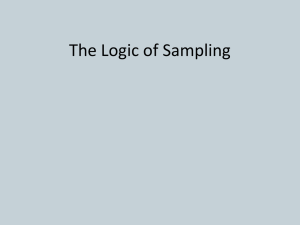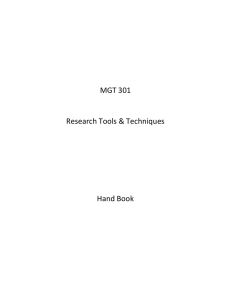1. The most important step in the research process is ______
advertisement
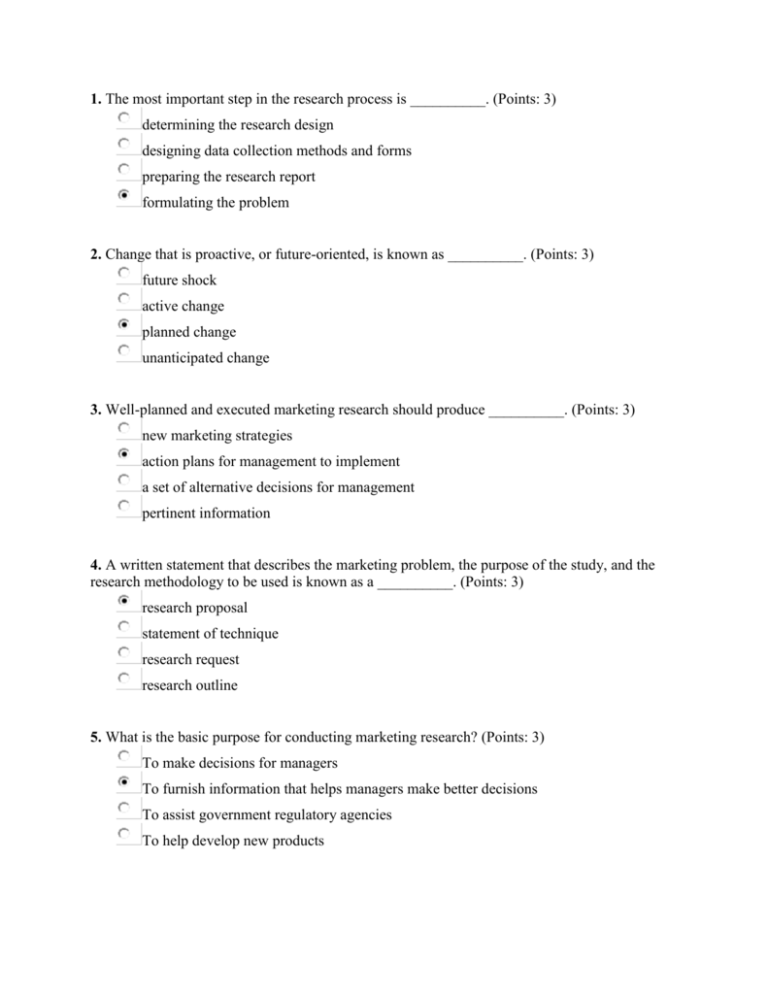
1. The most important step in the research process is __________. (Points: 3) determining the research design designing data collection methods and forms preparing the research report formulating the problem 2. Change that is proactive, or future-oriented, is known as __________. (Points: 3) future shock active change planned change unanticipated change 3. Well-planned and executed marketing research should produce __________. (Points: 3) new marketing strategies action plans for management to implement a set of alternative decisions for management pertinent information 4. A written statement that describes the marketing problem, the purpose of the study, and the research methodology to be used is known as a __________. (Points: 3) research proposal statement of technique research request research outline 5. What is the basic purpose for conducting marketing research? (Points: 3) To make decisions for managers To furnish information that helps managers make better decisions To assist government regulatory agencies To help develop new products 6. Which of the following is NOT a common activity of a marketing research department? (Points: 3) Measuring market potential Creating new advertising Conducting location analyses Preparing sales analyses 7. To design a marketing information system, analysts need to know __________. (Points: 3) what types of decisions each decision-maker regularly makes what types of special studies are periodically requested what information is necessary to make decisions All of the above 8. Historically, one problem with the research project emphasis of gathering marketing intelligence has been __________. (Points: 3) its crisis-response orientation its lack of validity the lack of trained researchers the lack of computer resources 9. The recommended minimum time spent in test market is __________. (Points: 3) less than 3 months 3 to 6 months 7 to 9 months 10 to 12 months 10. A causal research design is typically concerned with __________. (Points: 3) the frequency with which something occurs the discovery of ideas and insights how two variables vary together the determination of cause-and-effect relationships 11. Exploratory research can be used to __________. (Points: 3) increase the analyst's familiarity with the problem clarify concepts establish priorities in dealing with explanation of problems All of the above 12. Radio-listening statistics gathered by Arbitron are typically collected using __________. (Points: 3) people meters Since 2007, Neilsen uses Portable People Meters telephone surveys Audimeters mail diaries 13. BehaviorScan is an attempt to gain what advantage that mail diaries have over other scanners? (Points: 3) speed the matching of demographic characteristics to purchase behavior unbiased responses cost 14. Nielsen's Scantrack service allows clients to evaluate the effectiveness of __________. (Points: 3) short-term promotions pricing changes new product introductions All of the above 15. The Nielsen Retail Index is an example of a __________. (Points: 3) pantry audit diary panel audit store audit product audit 16. If possible, the researcher should always begin with which type of data? (Points: 3) internal primary data external primary data internal secondary data external secondary data 17. In general, the most productive source of internal secondary data for marketing research problems is __________. (Points: 3) the sales invoice the firm's annual report a salesperson's call reports individual customer records 18. An example of secondary data would be __________. (Points: 3) a survey conducted by the researcher statistics from the U.S. Census results of a field experiment conducted by the researcher results of a phone interview conducted by the researcher 19. Demographic and socioeconomic characteristics __________. (Points: 3) are easily gathered by researchers represent people's attributes define consumer personality types are all easily verifiable 20. Which of the following demographic/socioeconomic characteristics is generally the most difficult to verify? (Points: 3) Sex Age Income Education level 21. Attitudes and opinions __________. (Points: 3) may be treated interchangeably are both verbal expressions of internal feelings reflect intentions to purchase are best determined by observation 22. The depth interview __________. (Points: 3) causes severe problems in analysis requires highly skilled interviewers lacks structure All of the above 23. In indirect observation, the researcher is observing __________. (Points: 3) behavior intentions results of behavior attitudes 24. Observation in a laboratory, as opposed to a natural, setting has the advantage of __________. (Points: 3) behavior that is less restricted fewer tabulation and analysis problems better control of extraneous influences greater external validity 25. The number of "outs" in a baseball game is measured on __________. (Points: 3) a ratio scale an interval scale an ordinal scale a nominal scale 26. Which scale possesses an absolute zero? (Points: 3) Nominal Ordinal Interval Ratio 27. Code words, letters, or numbers used by security and intelligence organizations to form secret codes are examples of what type of scales? (Points: 3) Nominal Ordinal Interval Ratio 28. The use of a snake diagram is associated with __________. (Points: 3) Likert scales semantic-differential scales conjoint analysis Stapel scales 29. An example of a "motherhood" attribute of a new car would be __________. (Points: 3) the color the price body design tire brand used 30. A complete canvass of a population is called __________. (Points: 3) a census a sample a sampling frame a population 31. A stratified sample where the strata are sampled based upon their size and variability is a __________ sample. (Points: 3) disproportionate proportionate cluster random 32. Which of the following types of probability samples does not require a complete list of population elements by name in order to draw the sample? (Points: 3) stratified sample systematic sample area sample quota sample 33. Sample size depends on __________. (Points: 3) the type of sample the statistic in question the homogeneity of the population all of the above 34. Nonsampling errors occur because of errors in the __________. (Points: 3) conceptualization of the response project reporting of the project results arithmetic All of the above 35. Which of the following is a technique that measures the association between a criterion variable and one or more independent variables? (Points: 3) Correlation analysis Analysis of variance Regression analysis Z-test 36. The Kolmogorov-Smirnov test can be used to determine whether __________. (Points: 3) two independent samples are drawn from the same population two independent samples are drawn from different populations having the same distribution two variables x and y are correlated A and B 37. Trends can be best displayed by using a __________. (Points: 3) pie chart line chart pictograph bar chart 38. Which type of bar chart is most useful to illustrate the change in two or more series through time? (Points: 3) stacked bar-chart one-scale bar chart two-scale bar chart grouped-bar chart 39. When preparing an oral presentation, the first task of the presenter should be to __________. (Points: 3) determine who will be in the audience develop graphical presentation skills decide on the organization of the presentation test the sound system in the room 40. To improve your research report writing, __________. (Points: 3) use technical terminology read it aloud use complex sentences write only one draft 41. The Transportation Department at University of Houston wishes to determine what type of campus transportation system is preferred by UH's 30,000 undergraduate students. Data is collected from 400 undergraduate students enrolled in one section of Freshman English Literature. What type of sample is being utilized in this project? (Points: 3) Stratified sample I would think this since usually only Freshmen take Freshmen English. They are in effect creating a stratified sample. Nonprobability sample Objective sample Probability sample User sample 42. In the famous case in the 1980's, where Coca-Cola introduced the New Coke after much research, the failure of New Coke was largely due to a marketing research barrier identified as ________. (Points: 3) a narrow conception of the research uneven caliber of researchers poor problem definition late and occasional erroneous findings personality and presentation differences 43. Jane Doe wants to administer a short survey on "student driving habits" to a representative sample of students at the local university. She secured a list of students from the student directory. She assigned each student a unique number and then used a random number table to select her sample. The student directory from which Jane selected her sample of students to contact is referred to as _________. (Points: 3) sampling frame sampling control sampling error sampling directory None of the above 44. You have been assigned the task of evaluating consumer acceptance of and favorability toward a new product that a company has just test marketed in your area. In order to determine the degree to which consumers hold favorable attitudes toward the product, what is the lowest level of scale that you can use? (Points: 1) Nominal Ordinal Interval Ratio Need more information 45. A researcher developing a questionnaire becomes aware of an interesting additional relationship which could be investigated at very little cost and effort. He knows that this is not vital to his present research purpose. He should _________. (Points: 3) investigate it to a limited extent forget it evaluate the cost investigate it carefully investigate it, as this is likely to reduce sampling error 46. Ten volunteers are requested from your class to test a new bicycle. Of these ten, two are selected at random for the actual tests. The sampling frame consists of __________. (Points: 1) the students who were selected for the actual tests the students who volunteered Students who did not volunteer could not have been selected for the sample, there for they cannot be in the sampling frame. all the students in the class the students who were not selected all the students in the school 47. A respondent indicated she redeemed a coupon at Wal-Mart last week but later indicated that she had not visited a Wal-Mart in over two weeks. This type of response poses a problem of _________. (Points: 3) completeness legibility comprehensibility consistency uniformity 48. A questionnaire uses a 1-5 Likert scale to determine job satisfaction. When entering the data into a file, a researcher types a 7 instead of the 4 that the respondent had circled on the questionnaire. Such a mistake can be uncovered by performing what type of analysis? (Points: 3) Analysis of variance Regression Double-entry Frequency analysis Both c and d A frequency analysis would also show values that exist outside the expected range. 49. Which of the following is FALSE? (Points: 3) The research report is the end product of the research process. The fundamental criterion by which research reports are evaluated is communication with the reader. The report reader is the only reason to prepare a research report. The intended use of the research report does not affect the content of the report. The research report criteria of completeness, accuracy, clarity, and conciseness are related. 50. The researcher told his client that the data indicated a relationship between the weight of dogs and consumption of local dog biscuits. The researcher's remarks were _________. (Points: 3) a recommendation a conclusion a hypothesis a research proposal None of the above

